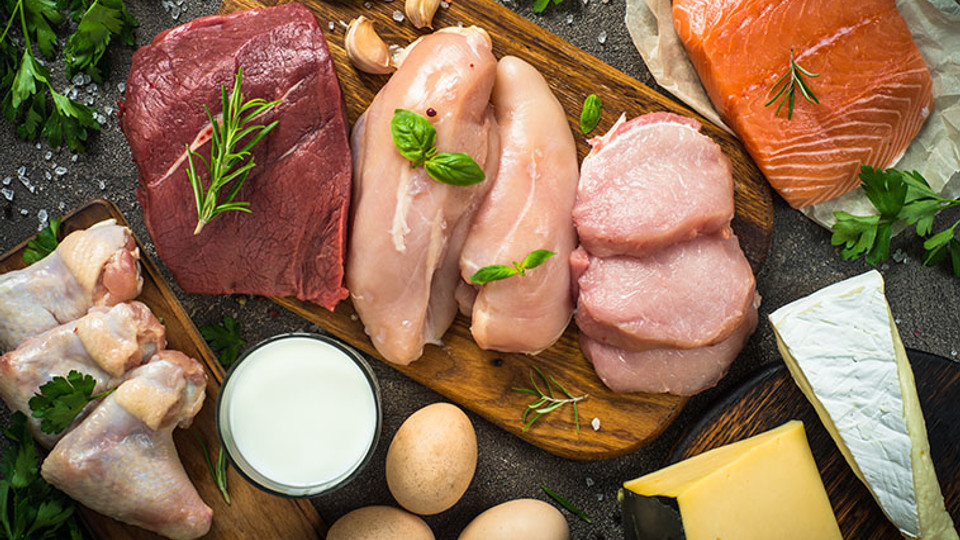
Protein has many functions within your body. It is used for building muscle tissue and cells, which is the primary reason athletes tend to eat so much of it. It is also vital for creating hormones and antibodies. As we age, heightened protein intake can even offset age-related atrophy.
We all need protein in our diets. Those involved in weight training need lots more than usual. So it’s a good idea to make sure we know where best to get it from. In this article, I’ll be talking you through some of the best animal sources of protein you should be looking into.
Top five animal-based sources of protein
Fish
One of the things to look for in your protein sources is what else you get besides the protein. Fish and seafood represent a solid choice for a full range of amino acids (the building blocks of protein.) However, you also get a range of vitamins and minerals with almost zero carbs and little fat. Omega-3 fatty acids are also common in fish, especially sources like salmon and cod.
Chicken
White poultry meat is incredibly lean, so you know that the protein you get is unadulterated by fat or carbs. Chicken is the go-to source, though turkey is also a good option. Breast fillets are usually preferred as they contain the most amount of lean protein and can make for a juicy, satisfying dish.
Pork
Many lifters veer away from pork due to its perceived high-fat content. Whilst this is often true, it comes down to what I said above about what else you get. Branched-chain amino acids (BCAAs) are key in supporting muscle development and recovery.
Leucine is an incredibly important BCAA for hypertrophy, and pork is an excellent source. Just make sure to portion your meals properly as the fat from pork can add up.
Steak
This is arguably the king of meats for exercise recovery and hypertrophy. This is so much so that it forms the main pillar of Stan Efferding’s vertical diet, which has helped such luminaries as Hafthor Bjornsson and Brian Shaw to meet their incredible goals.
Make sure you go for good quality, good cuts. There is a world of difference between ground meat from any old source and proper steak.
Steak cut close from the bone will give you plenty of creatine, which is essential for muscular performance, and all steak will give you a full range of healthy vitamins and minerals.
Milk and whey
Dairy is a great source of protein, with a full complement of amino acids in each serving. Most milk is fortified with vitamin D and all comes with calcium to aid in good bone health.
Whey protein powder is also amongst the cheapest, easiest ways to bring your protein intake up to where you need it. For the sake of a couple of scoops and a few seconds of glugging, you can hit a full 50g or more of good quality protein for a few cents.
Animal protein: amounts and benefits
Most people need around 0.8-1g of protein per 1kg of body weight. This will allow your body to function as it needs to, with enough protein to maintain good musculature and healthy hormones and immune system.
Weightlifters and strength athletes should typically be looking at 1.4-2g of protein per 1kg of bodyweight. This is what is needed to elicit hypertrophy and to allow you to keep up with the rigours of your training schedule.
For instance, I weigh 96kg (just over 15 stone Imperial.) I’m a strength athlete, blending powerlifting with strongman exercises. I lift 4 days per week, with each training day given over to one of the big four lifts (deadlift, squat, overhead press and bench- though I don’t really need to tell you that.)
I also cycle my lifting numbers, going for higher reps towards the beginning of each programming block, ending on low rep, strength sets.
All of this takes its toll. I generally consume anything from 3-4,000 calories per day (depending on the intensity of training and what else I have going on in my life.) Of this, around 175 grams, or 700 calories, will consist of protein. That’s 1.82g per kg of body weight (though realistically this is only ever a ballpark figure- a 10% leeway is generally OK.)
I take these calories as a mixture of plant- and animal-based proteins. My main animal proteins come from eggs and dairy, with perhaps 30% every day coming from whey protein isolate.
It’s important to take in animal sources of protein. Few plant-based sources are complete proteins- they don’t contain all of the amino acids our bodies need. Amino acids are what protein is made from, and animal sources contain the full range that our bodies need. In addition, few plant-based sources have protein in adequate quantities to hit the kinds of volume lifters need.
Of course, you can get a full range of amino acids on a plant-based diet by mixing and matching sources. You can get adequate quantities if you supplement well. It’s just a lot harder and more involved than relying on animal-based protein sources.



